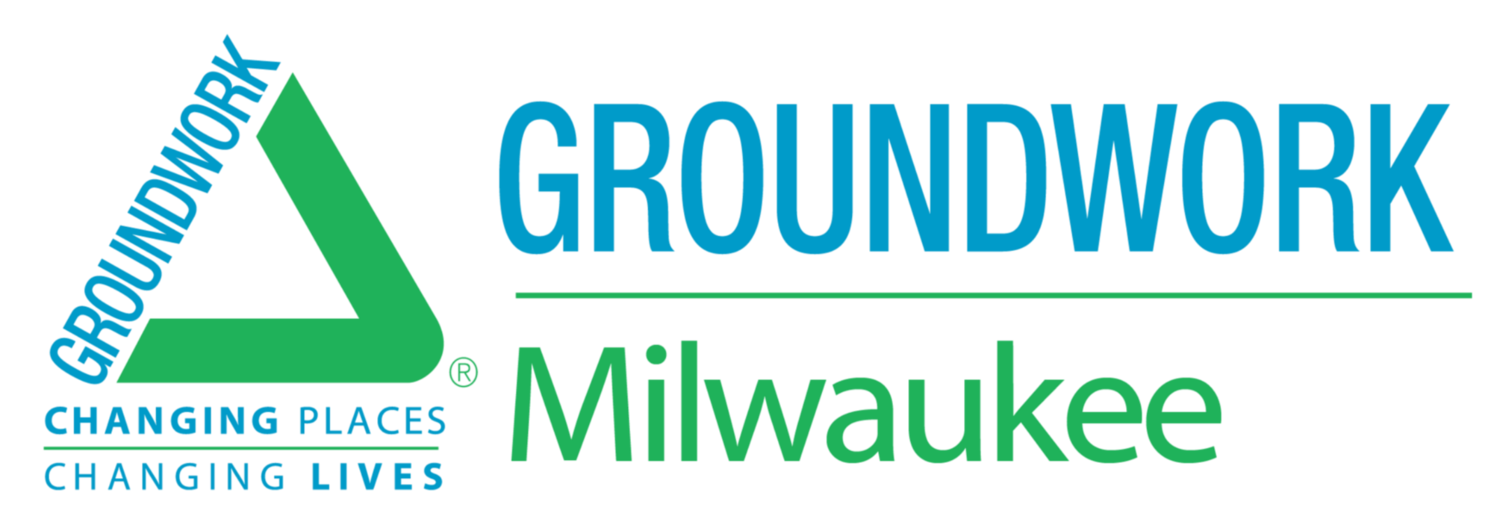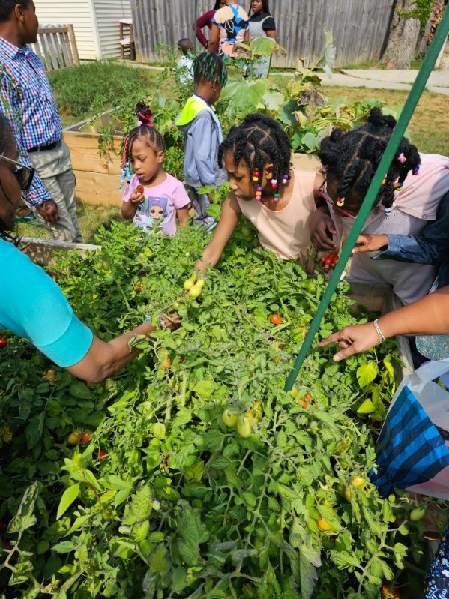Katharine Goray
Solomon Community Temple Belonging Place
“I don’t feel grounded or at home without a garden. They bring hope – you don’t plant a garden unless there is hope.”
For Katharine Goray’s 72 years of life she has almost always had a garden. Whether that was as a young girl in rural Kenosha, a renter in Madison or recent transplant to Milwaukee. She said gardens make her feel at home and grounded, and that gardens spark hope.
Since moving to the city in 2021, Goray has been working with her congregation on Martin Luther King Jr. Drive to revitalize the Solomon Community Belonging Place. In less than two years the garden has grown from six beds to 17. It includes a rain garden, pollinator garden, healing spaces, library, paths and benches. And the produce grown in the garden supports dozens of people through the churches food pantry.
What has impressed you about the northside’s urban spaces?
One of the things that really impressed me about Milwaukee is going around and seeing the murals and pocket parks. The spaces where people can feel comfortable coming on to the grounds and reading or relaxing.
We named the garden at Solomon’s Community Belonging Place because we want people to feel like they belong on the grounds. We purposely put a path to connect public spaces like apartments or the bus stop to the garden so everyone feels welcome.
What do you grow in the garden and why?
All the food from the garden supports the food pantry. We surveyed people to see what items were most important to them. So now we grow okra, collards and green tomatoes. These are items that don’t come in from the Hunger Task Force or other donations to the food pantry.
Fidel Verdin
Summer of Peace Community Garden
One of Fidel Verdin’s skills as a leader is lifting up the voices of others. As the co-executive director of TRU Skool, a nonprofit organization that uses arts and Hip Hop Culture to educate and empower families, he says the garden leadership council goes beyond gardening. “Food systems and food security are super important in our environment. But this garden council can be a voice for the collective,” he said. “ Gardening and vacant lot projects – this is something people can visually see the value in. But there is a lot of thought of intention and hard work to make these spaces possible.”
What do you grow in the garden and why?
In our garden we like to say “We grow possibilities.” We are not a garden or a community space that is heavy on turning out produce. We don’t grow to take it to market or sell it. We give most of the stuff we grow away. We experiment in the garden to learn and expose young people to different herbs, plants and vegetables. We may try it and it fails but it is about learning and expanding what we think is possible.
Why gardening as a means to grow community?
For me, it is about place-making or place taking, and being able to do something productive with the vacancies in the community. It is about being able to activate and redesign how we use these spaces. It naturally just builds community because humans want to gather.
Shanice BaqueT
NIA Community Garden
Shanice Baquet says gardening has been her life. As a trained master herbalist she says that before over the counter prescriptions were available her ancestors used herbs as medicine. “For viruses, illnesses and sickness there is a plant that can be used as a cure,” she says. “But we as humans need to learn and understand how the items that are here growing from the ground, are here for us to use.” For Baquet the garden is an extension of support she hopes to offer her neighbors. She also founded Mommy Beautiful Sunrise, which is a resource hub for African American families in Milwaukee for all things child development.
How is Nia Community Garden used to build community?
Nia in Swahili means purpose. Before it became a garden it was just a vacant lot but we wanted it to have purpose and to show the community is cared about. We grow produce for our house challenged community, who can come pick out of the garden and eat fresh produce during the summertime. The garden is here to sustain everyone in the community and to bring about economic exchange within the 53206 zip code.
What does the garden grow?
We have fruit trees, vegetables and herbs. We grow some herbs and add a new herb each year. We work with different farms or gardens in the area that have an abundance of food and bring it in to support the ones that live in the community. We also offer community events like the annual pumpkin patch event. And it is a sensory sensitive garden for children and families with disabilities.
Thanks to the Garden Council, and every Garden Leader! We’ll see you outside.


























